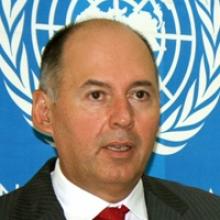Successful Examples of Adaptation and Resilience to Climate Change
Sustainability Session I
Organized by: Metropolis and Government of the City of Buenos Aires
The population growth of the major cities makes it necessary to take decisions on urban planning that take into account the challenges linked to the use of energy and water, gas emissions, the use of land, the prevention of pollution, and the regulation of traffic, amongst others. In this situation, the local authorities must implement sustainable growth policies which aim to offer solutions to mitigate and adapt to the effects of climate change.
With the aim of sharing successful actions with which to tackle this problem, the session was moderated by Juan Carlos Villalonga, Chairman of the Environmental Protection Agency of the Government of the City of Buenos Aires. The following presentations were given:
- 'The Sendai framework and urban resilience' by Ricardo Mena, Head of the Americas Regional Office of the UNISDR (United Nations Office for Disaster Risk Reduction).
- 'Methodology for resilience and adaptation of cities to climate change' by Víctor Said, the architect and urban planner of the Île-de-France Region (IAU - IDF) Planning and Urban Development Institute, a specialist in the cases of Alexandria, Casablanca, and Tunis.
- 'The Future Urban Masterplan in the Barcelona Metropolis and climate change policies' by Eduard Saurina, Management Associate of the Barcelona Metropolitan Area
- 'Signatory cities of the METROPOLIS No-Regrets Charter by Paul James, Professor of Globalization and Cultural Diversity of the Culture and Society Institute of the University of Western Sydney (UWS).
At the meeting, the challenges and drawbacks associated with climate change and natural disasters were debated, affecting many metropolises around the world, with particular reference to the cases of Alexandria, Barcelona, Berlin, Buenos Aires, Casablanca, Johannesburg, Rabat, and Tunis. There was reference to the 2009 Johannesburg ‘Plan for Adapting to Climate Change’, and the Law on Adapting to and Mitigating Climate Change approved in Buenos Aires in 2011, as examples of plans which have been successful in tackling these problems.
Large urban areas will continue to grow and receive more people over the coming decades and will have to tackle important challenges related to the energy supply, greenhouse gas emissions reduction, road traffic regulation and integrated water resource management, among many others. In this scenario, local governments have a crucial role to play with respect to climate change and must implement sustainable growth policies with a multidisciplinary focus. This involves accommodating the green, regenerative and socially sustainable economy into the economic model, making it a strategic objective for major metropolises. They are the cities which can best offer fast, flexible, balanced and creative solutions to mitigate and adapt to the effects of climate change.












